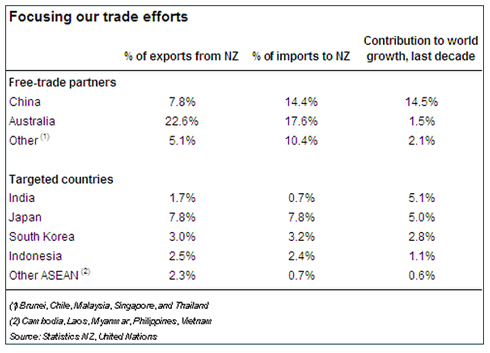 By Infometrics economist Gareth Kiernan This week's signing of a free-trade agreement with Malaysia has pushed our economy a little further down the path of being an "Asian nation", to borrow the description that Jim Bolger infamously applied to New Zealand back in 1993. And the path to "Asiafication" has a lot of miles left in it yet. A multilateral free-trade agreement (FTA) with the ASEAN nations is still waiting to be ratified, there has been preliminary work done towards bilateral agreements with South Korea and India, and our government has also been in dialogue with its Japanese counterpart to strengthen the two countries' trade relationship. Obtaining Malaysia's signature means that New Zealand now has FTAs with four of the ten countries in the ASEAN grouping, with agreements also in place with Australia, China, and Chile. Our table shows that the importance of China and Australia dwarf any of the other countries we've signed an agreement with.
By Infometrics economist Gareth Kiernan This week's signing of a free-trade agreement with Malaysia has pushed our economy a little further down the path of being an "Asian nation", to borrow the description that Jim Bolger infamously applied to New Zealand back in 1993. And the path to "Asiafication" has a lot of miles left in it yet. A multilateral free-trade agreement (FTA) with the ASEAN nations is still waiting to be ratified, there has been preliminary work done towards bilateral agreements with South Korea and India, and our government has also been in dialogue with its Japanese counterpart to strengthen the two countries' trade relationship. Obtaining Malaysia's signature means that New Zealand now has FTAs with four of the ten countries in the ASEAN grouping, with agreements also in place with Australia, China, and Chile. Our table shows that the importance of China and Australia dwarf any of the other countries we've signed an agreement with.
New Zealand's focus on largely bilateral trade agreements over the last decade has come as progress in World Trade Organization (WTO) negotiations has been almost non-existent over the last decade. Bilateral agreements are a second-best solution, with the scope for freeing up trade much lower than the global reach of the WTO. But the international recession of the last two years has highlighted that protectionist tendencies remain common in the US and Europe, the biggest global players, when economic conditions get difficult. Signing an FTA is, of course, no guarantee of export success. Chile is a prime example "“ the value of our exports to that country has actually shrunk since the FTA came into force in 2006. That said, New Zealand has little to lose by entering into FTAs with other countries given that our import tariffs are already low by world standards. New Zealand's unilateral reduction of tariff protection over the last 20 years has sent clear signals to businesses about what sort of products are economic to produce domestically. The changes have been detrimental to our manufacturing sector, but have ultimately enhanced the living standards of New Zealanders by improving our access to a wider range of goods from overseas. At the same time, our productive capabilities have been focused on goods that we actually have some comparative advantage in creating. In other words, despite the time and effort required to nail down bilateral trade agreements, they are worthwhile. FTAs have the potential to improve export incomes, as overseas consumers pay a lower retail price for our products while returns to our exporters actually increase as the overseas government no longer takes a share of the pie along the way. If New Zealand products attract lower import tariffs overseas, export volumes can also be boosted as our products gain market share. There are still some good-sized fish left to catch in the East Asia pond. India and Japan made the third and fourth biggest contributions to world growth over the last decade, South Korea was ninth, and Indonesia 17th. Medium-term growth prospects across Asia remain strong given that much of the continent is still firmly in "development" mode, and China's advancement shapes as being a powerful driver of the region's progress over the next 20 years. Events over the last two years have been a significant step towards China becoming the pre-eminent world economy. Just as the UK was usurped by the US last century, in terms of both economic and political power, China looks set to dominate the global landscape in 30 or 50 years' time. So the greater the number of trade strands leading into China, either directly or indirectly, that New Zealand can tap into, the better placed that New Zealand firms will be to ride along in the Chinese economy's slipstream over the medium-term. More trade will also boost social and cultural interaction with Asian countries. This interaction represents a change from our traditional cultural ties with Europe, and should be enriching for New Zealanders above and beyond the wealth gains achieved from increased trade. Although negotiating bilateral trade agreements can be resource-intensive and slow, this limited pace of change may actually mean that our integration with Asia is more ordered and less prone to xenophobic backlash.  ________________ * Infometrics is an economic information and forecasting company based in Wellington. To find out more, see its website here. This piece first appeared in the Dominion Post.
________________ * Infometrics is an economic information and forecasting company based in Wellington. To find out more, see its website here. This piece first appeared in the Dominion Post.
We welcome your comments below. If you are not already registered, please register to comment
Remember we welcome robust, respectful and insightful debate. We don't welcome abusive or defamatory comments and will de-register those repeatedly making such comments. Our current comment policy is here.